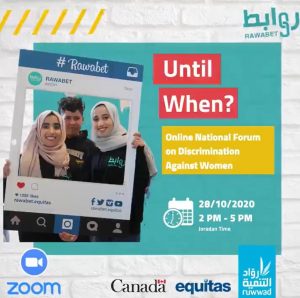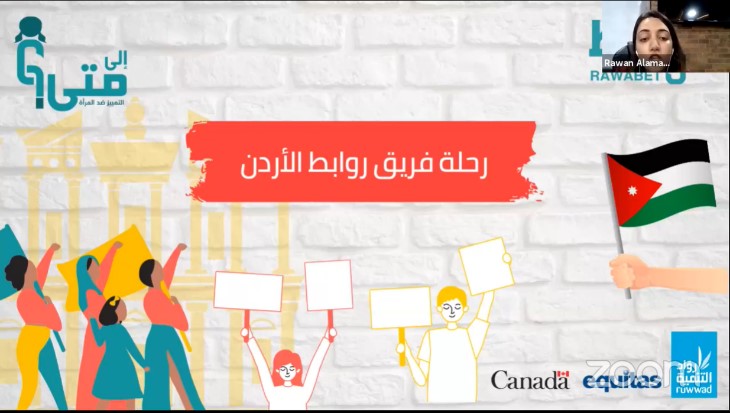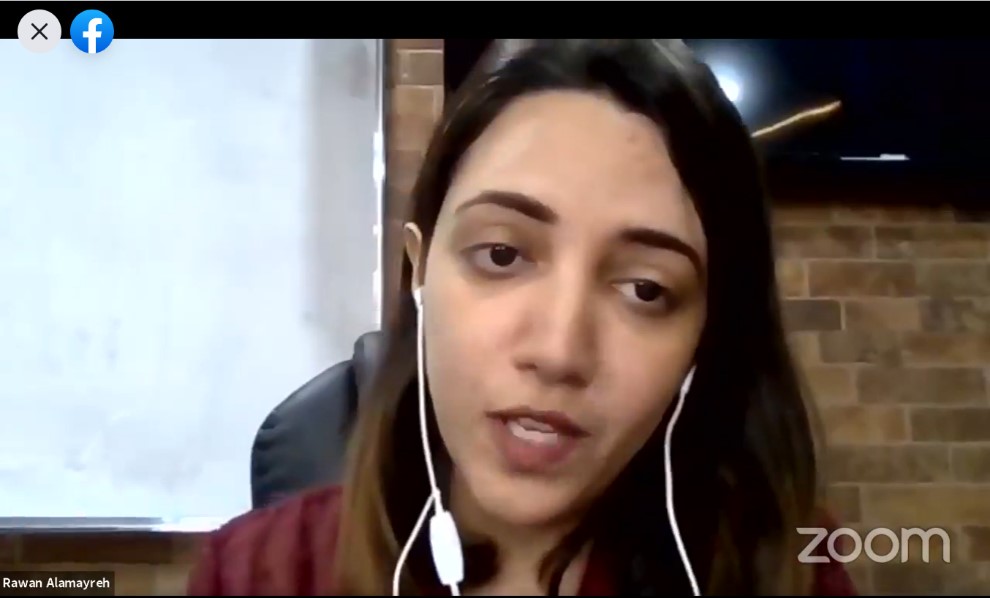The Initiative in Jordan is the story of 30 young women and men working with an unparalleled passion and a powerful belief in the value and dignity of human beings. They decided to exercise their freedom of choice, and in doing so, to touch the lives of more than 1,500 people in their local community.

On October 28, 2020, a national forum was held online in Jordan called Until When?, a culmination of three years of work by Equitas’ Rawabet Initiative, carried out in partnership with Ruwwad in Amman, Equitas’ partner organization in Jordan. The purpose of the forum was to address the issue of discrimination against women in Jordan and to develop recommendations with the help of forum participants. The event was organized by a team of young leaders who had participated in the Rawabet Initiative. More than 100 people interested in human rights issues in Jordan attended the forum, representing civil society organizations, and both the public and private sectors.
In her opening remarks, Odette McCarthy, Executive Director of Equitas, explained how Equitas’ objective through this human rights education Initiative was to increase the ability of young people, women and people living with a disability to participate in democratic processes and to exercise their human rights. To reach that objective, Rawabet put the human rights-based approach at the heart of its activities and used communications and digital technology like social media and online platforms as key tools.
This Initiative could not have taken place without the significant involvement of a group of 30 young leaders. These young people learned how to apply a human rights-based approach to their work in training sessions and workshops carried out with support from Equitas and Ruwwad. Following these training sessions, with Equitas’ support, they were able to launch digital campaigns to create an online activism movement, which proved extremely relevant in the present pandemic. Elements of the Rawabet Initiative, including the community actions, are all founded on the human rights-based approach and incorporates a gender perspective. They did so by emphasizing the participation and inclusion of marginalized groups in their community actions, as well as by emphasizing the importance of equality, accountability of the decision makers, full transparency and empowerment of community members to create change.

Rawan Alamayreh, who directed and coordinated the Rawabet Initiative within Ruwwad, presented the journey the young participants had followed over the past few years at the forum. She noted that, over the course of their work, they not only sought to find the major causes and bases for violations of human rights, but also took on a human rights culture as a practice. They did so by emphasizing a participatory and inclusive approach in their community actions, as well as promoting the importance of equality, accountability from decision-makers, total transparency, and the empowerment of community members in order to create change.
Their work aimed to build safer, more inclusive, and resilient communities that demonstrate a greater respect for human rights. Each step of the way, these young people spoke out against discriminatory behaviours towards women in their surroundings, insisted on the importance of inclusive language and pushed to recognize prejudices that feed into unfair stereotypes of women.

This naturally led them to ask: Until When? will these flagrant human rights violations continue? As Rawan mentioned in her remarks:
Discrimination against women has roots that extend to our homes, within our families, in our offices and work spaces, within parliament and ministries, and in spaces where democratic life happens in general. Human rights are indivisible and violations in one space are therefore linked to violations in other spaces as a cause to an effect.“ – Rawan Alamayreh
The Rawabet Initiative has reached over 230,000 people in the Middle East and North Africa, specifically in Jordan, Tunisia, Morocco and Egypt, through 14 community actions and media campaigns with targeted messages about human rights. Rawabet participants were able to amplify calls to decision-makers, exercising their human rights while reclaiming those of others, especially for marginalized groups.
However, although the Initiative has come to an end, the work is not over. As Samar Dudin, Regional Director and Head of Programs at Ruwwad, put it at the forum:
The technological efficiency through which the event was managed helped frame the advocacy recommendations across the panels that explored in depth the barriers and required legislative changes towards greater gender equality and respect of women’s rights. Ruwwad will discuss these outcomes with the youth leaders and will communicate them to the Higher Council for Human Rights as well as the National Women’s Committee.”
Tangible results of the remarkable journey of these 30 young women and men and of the impact of this partnership between Equitas and Ruwwad in Jordan give a sense of the scope of the effort and the work that was accomplished. The impact of this initiative has fueled a drive to continue the journey towards a greater respect of human rights in Jordan.